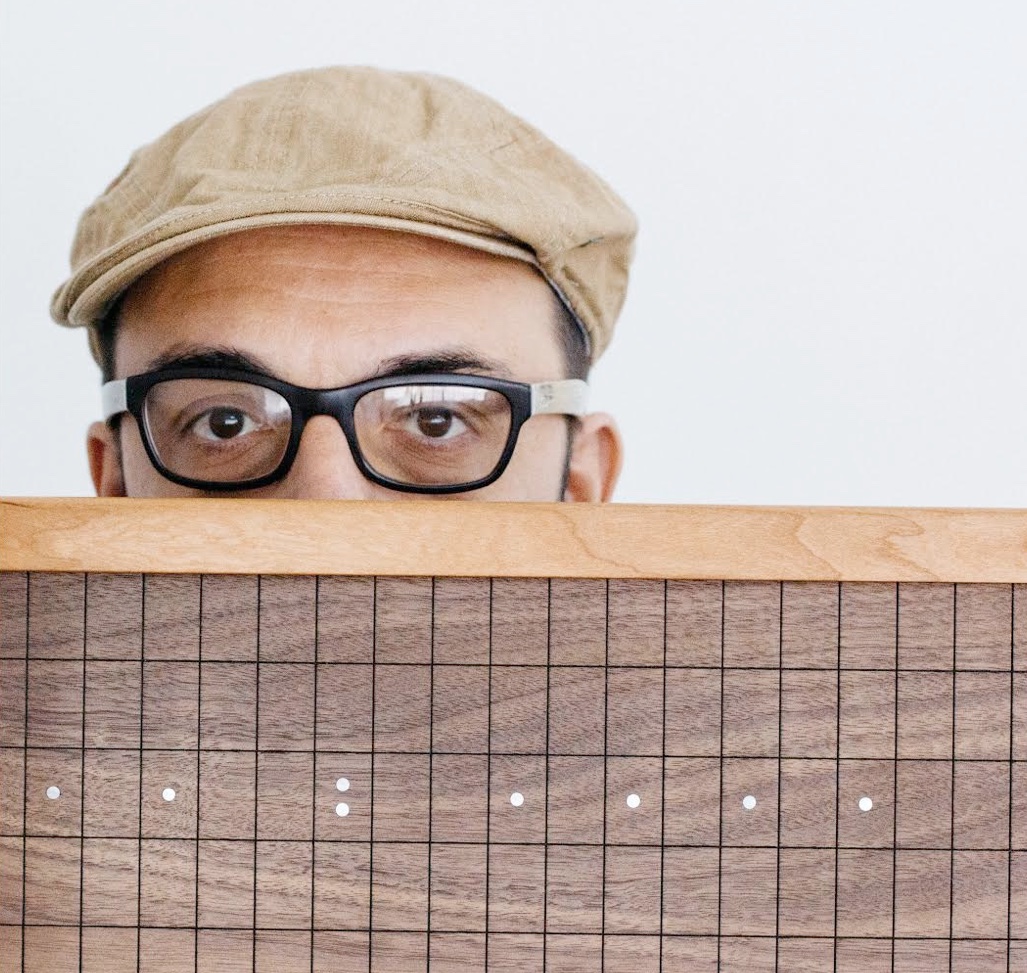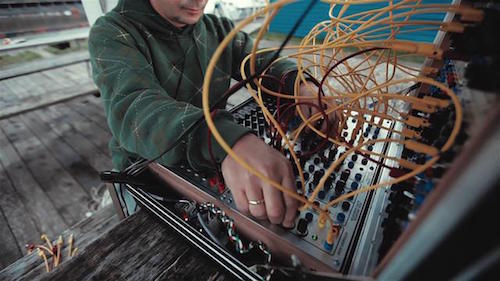
Rastko Lazic is a composer and improviser of electronic music based in Yangon, Myanmar. Through the magic of the internet, by which our shared love of weird devices and ideas about sound transcends time and space, many of his works made their way to Seattle. What's in them? A devotional attention to the basic qualities of sounds both found and generated, it seems, and a purposeful collection of digital and analog devices for focusing it.
In a recent video you posted online, you made a very expressive connection between the Soundplane and a Serge Modular Synthesizer. What are the aspects of the Soundplane that inspired you to use it in this way?
I have been interested in controlling the modular synthesizer with either movement (Serge Modular and the Theremin https://vimeo.com/42150452 and Tuning a Performance https://vimeo.com/86026852 and Tape002 https://vimeo.com/46954260) or touch and pressure (Popcorn https://vimeo.com/31022576) for a long time.
The Soundplane fits perfectly into this exploration. The Soundplane sends information from three dimensions and can do that from multiple touches simultaneously. From the four touches, I use one could take the difference between touched values and use that as a new value. Or any other equation. Like Wiard JAG https://malekkoheavyindustry.com/product/jag/ but with a possibility of 32 inputs. In this way, you get a lot from the touches and movements.
What is most important is that the Soundplane works and feels really well when played. A beautiful instrument.
For the connection between the Soundplane and the Serge I used the Expert Sleepers ES-3 module. For the translation from OSC into CV, I created a custom Max/MSP patch.
You seem to be a big user of modular synthesizers. What is it specifically about modular synthesis you enjoy?
The first thing I loved about the modular synths was the sound or either the vast possibilities to create new and alter existing sounds very fast. I love the way Serge (I have a Serge Modular synth) managed to make so many functions in a very compact space and I love the fact that nothing was forbidden and that with mistakes and chances one came to sounds never thought of or heard before. Many modular synth manufacturers are now expanding on this idea and are involving digital technology as well.
Modulars are great open systems and for the most part, the only limit is one's imagination.
You can hear some of my first recordings with my modular here on “This Room Is Too Small” https://rastko.bandcamp.com/album/this-room-is-too-small and see me playing my synth on my friends boat and on his artificial island (a movie prop he got as a present) in my favorite part of Belgrade, Serbia on the river: Rastko And His Serge https://vimeo.com/19058233
This love for modular begun with me listening to a lot to older electronic music from the late sixties. I bought a lot of old library books about the music and the techniques used and read through every manual for old modular synths I could download. I found out about the Serge modular synth from these books.
I really got obsessed with my Serge in a very good way and it makes me happy. Modulars can give you this childlike happiness of discovery and this is great. I always think about new ways to connect things and wonder what would happen. I love the feedback patches and the sounds coming from them, it is like a living organism. These patches never end to surprise and excite me. This is something I can not find in computer software.
The thing I discovered is that smaller modular systems are much better for performances and playing. At least for me.
I now use more software but I learned a lot from modular and I am creating presets in a similar way I would patch a modular.
Most of the software instruments I now use is inspired by the modular instruments so it is not so hard for me to adapt and understand them. Now I am creating more and more Max/MSP patches to add more control, randomness and the chance to midi that is sent to software instruments.The software instruments maybe do not sound as good as the Serge but they sound different and are sounding better and better. The reason why I do not use the modular so much anymore is that I like the idea of a static instrument in a sense that I separate patching and playing.
With modular I use a long time to patch and then after recording it is gone. In one way this is great but I also like to be able to just switch on the instrument and play it. This is what software is good at. I use them to create the patch in, for instance, Aalto and with a dial, I can come to that sound again and play it. This with live preset switching becomes very powerful.
I started performing and working like this with the wonderful Nord Modular Micro and, here again, I play with a controller but this time, I limited it to knobs and faders: Micro Modular Patches https://vimeo.com/65191738

In addition to modular synthesizers, you also employ Madrona Labs’ Aalto and Kaivo in your compositions. How do Aalto and Kaivo fit into your workflow?
Aalto and Kaivo work really well with the Soundplane. They are a perfect match. Aalto has a great interface and with the constraints, it has it forces the user to think of new ways to create presets and sounds. One can use some elements which are not intended to be used in some conventional software instruments. For instance envelope as a sound source. This is very much the thought of Buchla and Serge.
On the other hand, Kaivo sounds incredibly acoustic and often it is unreal when touching the wood surface of the Soundplane that these gorgeous string sounds come out. It really becomes an acoustic instrument and one forgets the computer and the electronics. Really you could think that these strings are somehow under the wood. Every subtle pressure or rub creates sound. These sounds can be wonderfully weird and abstract.
On these latest recordings, it is mostly Kaivo played live on the Soundplane: Yangon Miniatures: http://rastko.bandcamp.com/album/yangon-miniatures
Your website states that you have been composing music since 1996 for contemporary dance, theater, and television. What are some of your favorite compositions you have done?
Well, maybe the two beginnings are my favorite.
The first one was the soundscape for the Copenhagen Culture City 1996. The composition was performed from the underground toilet under the main square in Copenhagen. They had a joystick and 8 channels of audio I could move on a large array of speakers under the square. The speakers were in the water drains. This was the first time I was doing musique concrete. The first time doing soundscapes as well.
I just came back from studying audio engineering in London and amazingly enough on this whole audio engineering course there was no mention about the history of electronic music and sound. It was all about types of microphones, technique and industry. Now I am much more interested in the history and the art of sound.
The second favorite piece was done for Dalija Acin and her “Handle With Great Care” performance. This composition was important for me as I realized that I have to do what I feel like and not to try to please everybody and follow the rules. We created a long and loud noise piece that we felt is perfect for the choreography. At that time, some colleagues told me it is impossible to do such a thing and that these frequencies can not be used. The performance was a great success and while watching it I was really touched. My sound was just a part of this. Dalija and Ana are great performers.
This is actually a recording of the whole performance but it is hard to understand it from the video as it has to be loud and just being in the audience is different than watching it on Vimeo: https://vimeo.com/11601471 What is really funny is that somebody posted the same performance but decided to put on something I assume he or she thinks is real music: https://www.youtube.com/watch?v=LRLfjBhK2XM
Much of the music you have shared online shares a unique style of electronic ambiance. What about this style of music speaks to you and what are your creative goals in terms of music composition?
It is a mix of a lot of things I am interested in. I like noise music and I use it subtly almost always. Then I like the self-generating patches and I made a lot of recordings of that. Right now I am interested in minimal music and just enjoy playing and recording simple short structures. Here in Myanmar, I play a lot of gongs and local percussions and now finally I have a possibility to record that properly so that should be on the net soon as well.
All these different sounds I make come from my surroundings and I am very much influenced by the people and the sounds that surround me every day. I am very lucky that I traveled a lot and lived in a lot of places so the sounds and smells from these places influence me and the music I play and record.
Often it is also some events in my life that put me usually in a rather melancholic mood. There is a reason for that and I think this is not so bad actually.
I really do not have any goals. I let the sounds play and I record them, then I like them or not. I try not to edit so much but to record as much as possible live.
I love sound. Melody and sound are for me equal. Sometimes in these sound textures there is a melody hidden, discovering this melody is the beauty.
profile: Josh Leibsohn
photos: Rastko Lazic
Serge Meets Soundplane from Rastko Lazic on Vimeo.